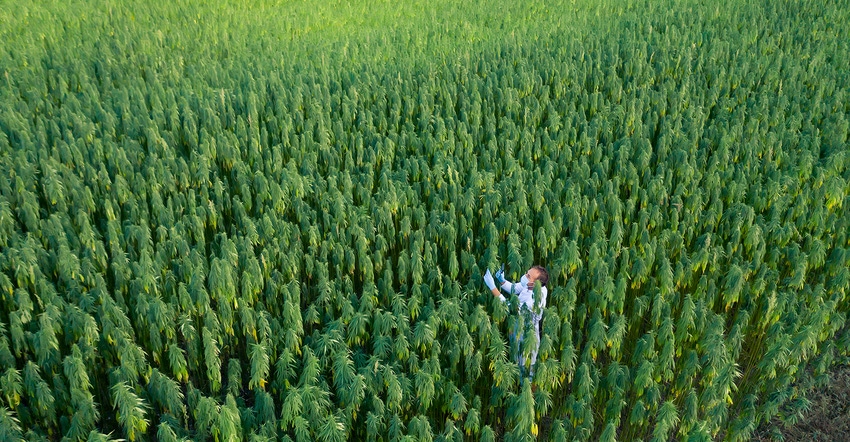Tips for brands: Questions to ask CBD and hemp suppliers
A quality hemp CBD supplier should demonstrate a deep understanding of botanical processing and extraction methods.

Navigating the supply chain can not only be challenging, it can also mean the difference between championing a successful product or one that misses the mark—whether during testing, attempting to scale production or proving useful (or even attractive) to consumers.
Brand owners can empower themselves by asking the right questions. The following should be at the top of the list when vetting a hemp CBD supplier.
1. Where is your hemp grown and cultivated? Tell us about the practices.
Brands should look for hemp that is cultivated and harvested in the U.S. and fully compliant with the 2018 Farm Bill. The Farm Bill allows for the broad cultivation of hemp, but also stipulates that the hemp cannot contain more than 0.3% THC—and must also be adhered to in CBD and broader cannabinoid and hemp extract ingredient production and provision. Brands need to make sure their supplier(s) can produce evidence of rigorous testing and compliance. Any hemp cannabis plant that contains more than 0.3% THC would be considered non-hemp cannabis, or marijuana, and is not federally approved. Additionally, as with many regulatory issues in this industry, there is still a shared state-federal regulatory power over hemp cultivation and production, so it is also important to keep an eye on state-by-state legislation.
Sourcing U.S. grown hemp that is verified to meet the requirements of the Farm Bill is imperative to reducing ingredient, supply chain and compliance risks. Also, look for transparent, sustainable farming practices for the production of clean, compliant biomass. Some brands in this burgeoning industry are looking for sources outside of the U.S., but this can present big industry risks during a time when it is essential to earn consumer trust regarding product quality, compliance, legality and purity.
Hemp is also a bioaccumulator—a crop often used to clean soil of contaminants—so it is important to make sure it is grown in clean, well-monitored conditions. It is strongly encouraged to seek CBD and hemp extracts only made from USDA Certified Organic biomass.
Sustainability is becoming increasingly important to many consumers as they look to align with companies that take social and environmental responsibility seriously. Find out if the hemp is grown, harvested and processed in a sustainable manner. Ask the supplier about the agricultural practices in place, and to substantiate any sustainability claims it makes.
2. Is your facility cGMP (current good manufacturing practice) certified? If so, by what organization? Tell us about your control processes. And what kind of equipment do you have?
Cultivation and processing facilities should be cGMP certified, ensuring clean, regularly inspected, professional facilities and operations. cGMP from a third-party agency such as NSF or UL is a critical requirement brands should look for in any CBD supplier. All too often suppliers, especially extractors, take shortcuts this area of quality.
Find suppliers with a deep understanding of botanical processing and extraction methods. Ask questions about their experience in farming, harvesting, extracting and innovating with botanicals. It is not uncommon in this “green rush” era to find rogue operators and industry newbies who don’t have the experience big brands and consumers deserve. Scores of “vertically integrated supply chain” operators are actually extracting in their backyards or garages, sometimes even using household consumer-grade appliances or equipment. It really does happen, and brands need to critically understand the differences between that scenario and a company that operates with true cGMP certifications, rigorous quality and testing procedures, batch controls, traceability and transparency protocols, food grade standards, and sustainable professional operations.
Also ensure that when a supplier says it is fully vertically integrated, it can back up the claims with the real infrastructure, experience and credentials that make the entire supply chain transparent, reliable and consistent.
3. Is the product “organic compliant” or USDA Certified Organic? And, does that apply to both farming and extraction?
Being “organic compliant” is different than being USDA Certified Organic. Brands need to ask this question and ask for certificates.
USDA certified organic validation ensures rigid standards for not only the hemp, but also involves regular testing of the soil and water to ensure no residual glyphosates or other unwanted chemicals (such as pesticides and herbicides) will be found in any of the organic hemp and resulting extract ingredients.
Additionally, while USDA Certified Organic biomass is the must-have starting point for all hemp processors, brands must also ask if the process and all additional ingredients are also USDA Certified Organic to ensure the highest possible quality. Claims will be limited if only the biomass is USDA Certified Organic, and the extraction process, carrier oils and other ingredients are not.
4. Are you properly equipped and capitalized to scale our brand growth and market penetration?
Thanks to the path toward deregulation of hemp extracts and CBD in the U.S., the industry is at the beginning of its booming life cycle, and many companies want to join in the green rush. Not surprising, even in its infancy, hemp could quickly become the third- or fourth-largest cash crop in the U.S., just behind crops like corn and soybeans (Whitney Economics, The Field of Dreams, 2019). In its “2019 U.S. Hemp License Report,” hemp advocacy organization Vote Hemp noted 511,442 acres were licensed to grow hemp in 2019—a 455% increase over 2018.
Brands must realize that many of the companies rushing into this space are new, with little experience in botanicals, extraction, compliance operations and ingredient provisioning. In order to ensure a reliable and secure supply chain, ask specific questions about experience the proposed supplier has in this area. How do they manage fluctuations in demand? How do they scale? Do they have extensive experience in botanical cultivation and harvesting, as well as launching products and innovating? Many brands are scaling incrementally, and their demands grow as they begin to serve broader territories and launch additional products. This kind of scaling requires a reliable and well capitalized supplier; one who has the capacity, throughput and capital to support brand growth and innovation.
Regarding extraction, it is important to learn more about the capabilities of the biomass extraction facility. Does the staff have technical knowledge of extraction? Does the supplier have the ability to extract via supercritical carbon dioxide (CO2) and organic ethanol, as well as separate minor cannabinoids? What testing methods are used to verify the constituents and levels? Liquid chromatography (LC) can provide accurate analyses.
5. Do you have an in-house laboratory? And do you do 3rd party testing? What do you do to ensure compliance and manage THC levels? What paperwork can you provide?
Ideally, the supplier conducts its own rigorous testing in its own labs, and also works with third-party laboratories through every stage of the supply chain to ensure and validate quality and compliance. Thorough testing is critical, from seedling testing during farming, to extraction and finished goods testing. Third-party laboratory testing is crucial to provide an objective, unbiased result—not only for quality, but also from a compliance standpoint. Make sure that a proposed supplier is testing not only for cannabinoid and terpene levels and profiles; and contaminants like heavy metals, pesticides, residual solvents and microbials; but also for THC content, which must not exceed 0.3%, with fully documented proof.
A processor that has both an in-house lab and third-party lab provides multiple sources of documented proof that the product is in compliance—and brands must absolutely look for this. Brands need to also be sure they receive all proper paperwork required by local, state and federal agencies.
6. What kind of extraction method is used? And can the supplier help actively drive your innovation pipeline?
Acceptable forms for hemp extraction use CO2 or organic ethanol. Rogue players use butane or other unacceptable, unsafe chemical methods. Expert suppliers often employ proprietary extraction methods proven at scale and diligently work to implement techniques that ensure consistency, yield and purity—all geared to provide value to brands and consumers.
Consumers are gaining an understanding of the benefits of full- and broad-spectrum cannabinoid hemp extracts, and are also investigating the use of lesser-known, minor cannabinoids and benefits of terpene-rich formulations. Can the supplier ensure exactly what constituents are contained in the extract, and without the risk of even trace amounts of residual THC? In addition, aspects of efficacy, dosing and bioavailability are important considerations requiring expert extraction and specific testing. Can the supplier help with formulation for the application? Many brands are looking for rapid ingredient and format innovation. Does the supplier offer ingredients that are water soluble, available as nanotechnology emulsions or powders, and can they offer deep understanding of other botanical actives that can complement CBD and hemp extracts to truly support a brand’s innovation?
The hemp and CBD industry is burgeoning, with new players entering daily. Make sure to work with a reliable supplier for raw materials, and ask them the tough questions. Ensure they have the experience, technical ability, processing capabilities, certifications and quality assurance (QA) commitment necessary in order to verify one is getting the best ingredients and service available.
Collette Kakuk is vice president of global marketing for Layn Natural Ingredients and its subsidiary, HempRise. She has 30 years of experience in branding, customer experience, qualitative and quantitative market research, predictive modeling and competitive analysis, including food service, food processing, manufacturing, restaurant, banking and top Fortune 100 business consulting. Her passion for people, animals and the planet fuels her interest in natural botanical ingredient marketing and innovation. She proudly served in the U.S. military and holds an MBA from the Ross School at the University of Michigan.
About the Author(s)
You May Also Like






.png?width=800&auto=webp&quality=80&disable=upscale)